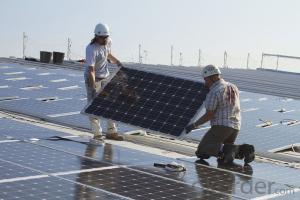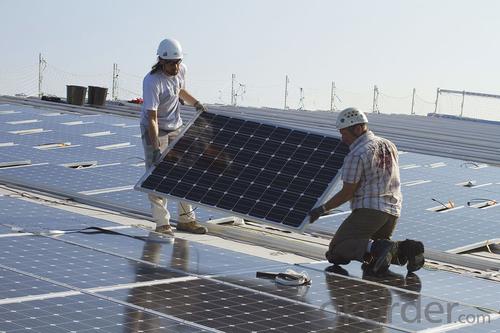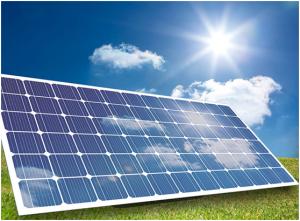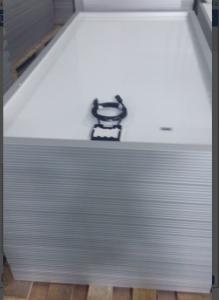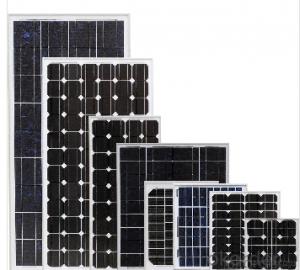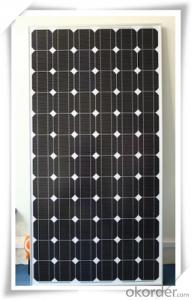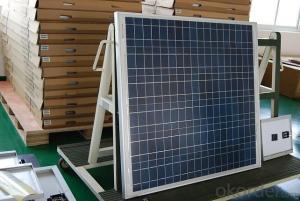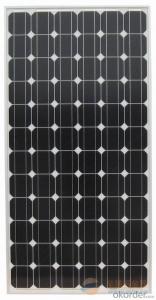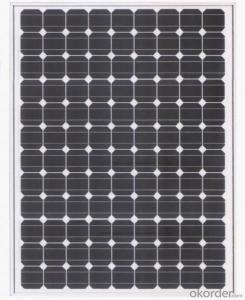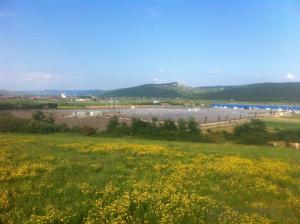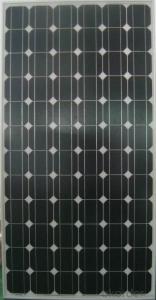Plug-In Solar Panels 160W Monocrystalline Factory Sales CNBM
- Loading Port:
- Qingdao
- Payment Terms:
- TT OR LC
- Min Order Qty:
- 10 set
- Supply Capability:
- 300000 set/month
OKorder Service Pledge
OKorder Financial Service
You Might Also Like
1.5W to 180W Monocrystalline Solar Panel
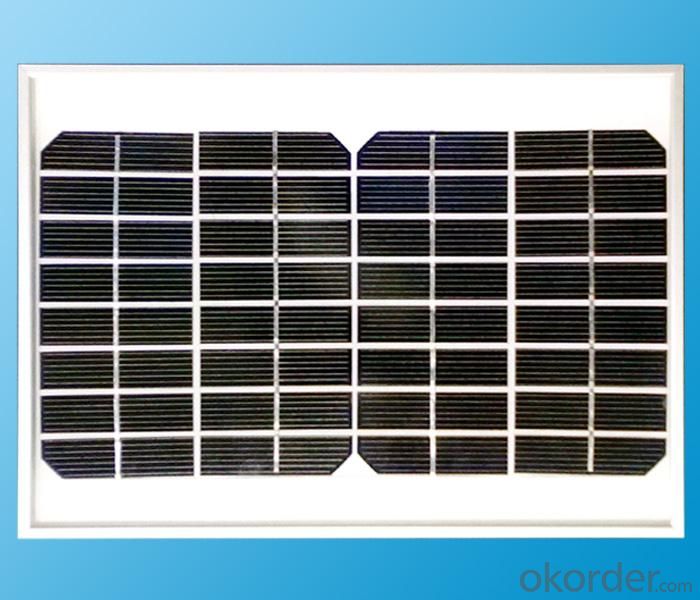
Quick Details
Place of Origin: | China (Mainland) | Brand Name: | CNBM | Model Number: | XRP-156M-250W |
Material: | Monocrystalline Silicon | Size: | 1620x992x40mm | Number of Cells: | 60 |
Max. Power: | 250w | Optimum Operating Voltage (Vmp): | 28.8V | Optimum Operating Current (Imp): | 8.68A |
Open Circuit Voltage (Voc): | 36V | Short Circuit Current (Isc): | 8.87A | Maximum Power at STC (Pmax): | 250W |
Operating Module Temperature: | -40 °C to +85 °C | Maximum System Voltage: | 1000 V DC (IEC) / 600V DC (UL) | Maximum Series Fuse Rating: | 15A |
Packaging & Delivery
Delivery Detail: | two weeks after order confirmation |
Features:
1) High Module conversion efficiency, through superior manufacturing technology
2) 0 to +5W positive tolerance for mainstream products
3) Certified to withstand high wind loads and snow loads
4) Anodized aluminum is for improving corrosion resistance
5) Anti-reflective, Highly transparent, low iron tempered glass
6) Excellent performance under low light environment
Benefit:
25-year performance warrant
10-year Product warranty
Electrical Characteristics:
Item No. | XRM-250W |
Optimum Operating Voltage (Vmp) | 28.8V |
Optimum Operating Current (Imp) | 8.68A |
Open Circuit Voltage (Voc) | 36V |
Short Circuit Current (Isc) | 8.87A |
Maximum Power at STC (Pmax) | 250W |
Cell Efficiency | 17.70% |
Operating Module Temperature | -40 °C to +85 °C |
Maximum System Voltage | 1000 V DC (IEC) / 600V DC (UL) |
Maximum Series Fuse Rating | 15A |
Power Tolerance | 0/+5 % |
STC: lrradiance 1000 W/m2, module temperature 25 °C, AM=1.5;
Best in Class AAA solar simulator (IEC 60904-9) used, power measurement uncertainty is within +/- 3%
Mechanical Characteristics:
No. of Cells | 60(6X10) |
Dimensions | 1640x992x40MM |
Weight | 20.0KGS |
Front | Glass 4.0 mm tempered glass |
Frame | Anodized aluminium alloy |
Temperature Characteristics:
Nominal Operating Cell Temperature (NOCT) | 45±2°C |
Temperature Coefficient of Pmax | -0.44 %/°C |
Temperature Coefficient of Voc | -0.33 %/°C |
Temperature Coefficient of Isc | 0.055 %/°C |
Refer to the Wmp range
Our factory can produce solar panel and solar module from 1.5W-290w (1.5w, 2.5w, 5w, 10w, 20w, 40w, 50w, 60w, 80w, 85w, 125w, 135w, 150w, 165w, 180w), according to customers requirement.
(A). Wmp range: 0.01W-6W, to be sealed with epoxy resin on PCB (printed circuit board), or to be sealed in plastic directly.
(B). Wmp range: 0.01W-15W, to be encapsulated with PET, on PCB (printed circuit board)
(C). Wmp range: 1W-60W, to be encapsulated with PET, on stainless steel, with holes for assembling purpose.
(D). Wmp range: 1W-290W, to be encapsulated with tempered glass, EVA, TPT, together with aluminium frame, junction box and (if necessary)diode and cable.
Refer to the material:
Monocrystalline solar cell or polycrystalline solar cell
Efficiency range 14%-17%, cell size 5/6.
- Q: Ok so i can have a problem i have two 5 watt 2 volt solar panels a 2 volt battery and a 400 watt ac 2 volt dc inverter i believe im only getting 5 watts from from my solar panels thats the equivalent of one is there any way i could get full voltage from my solar panels without theoretically burning my wallet.. please help
- I think you need to take some basic courses on electricity. Usually, 8 volt solar panels are required to charge 2 volt batteries. The voltages of photovoltaic cells are set by the material they are made of, only current changes. If you hook up a 2 V solar panel to a 2 V battery, no current will flow, nothing would get charged. You would need some elaborate DC to DC voltage converters to charge a 2 V battery from 2 V solar panels. Solar panels can be connected in parallel or in series, as you've made the mistake of buying 2 V solar panel, you would have to wire them in series and have a charge controller that could limit the voltage of the charge. Did it ever occur to you that two 5 watt solar panels would not be able to provide the power needed by a 400 watt inverter? You're just running off your battery with your set up. Solar power is expensive power, you can not have solar without burning a hole in your wallet.
- Q: I'm re-doing my roof. Is it workable?Can I get a government grant or something to put solar panels on my roof?I know they did something like that for windows.
- I don't think you can get a government grant? At least not just yet... But, you can get a nice Tax break for having installed solar panels on your home or for some their backyard works well. But, again you must be aware that having professionals install these panels can be quite costly. If you don't mind getting your hands a little dirty, tackling this project on your own isn't as hard as you might think! And you will be amazed at how much money you can save from the start. And if you get the family involved all the better! Building affordable solar panels for your home, is no pipe dream...But, you must be willing to do the work yourself! That's usually where most people fall short.
- Q: Can solar panels be leased or financed?
- Yes, solar panels can be leased or financed. Many companies offer leasing or financing options for solar panel installation, allowing homeowners and businesses to enjoy the benefits of solar power without the upfront cost. Leasing or financing arrangements typically involve monthly payments over a set period of time, making solar energy more accessible and affordable for a wider range of people.
- Q: I've found something called maximum system voltage 000v on my 0 w panel nameplate. Its impossible for 0w to have 000v, right?
- Hi No i very much doubt it could produce that sort of voltage so get a voltmeter and check it. bright sunshine and dark.
- Q: I'm curious, for those who have had solar panels installed on the rooves of their houses:How much did you pay? How much energy do the panels produce? Did it dramatically cut down on your electricity bill? Was it worth it? Thanks!
- No, but if you have the money, go for it. In Germany, people get a government rebate (much like the Prius rebate our own government offered) and so you see solar panels everywhere. If the Obama administration pushes for a rebate for solar panels, you will see them here in the state. It's the initial cost that puts off most potential solar panel customers. Upkeep isn't too expensive, and they ultimatley pay for themselves. (after about a decade)
- Q: Monocrystalline panels are sooo expensive! Thanks for reading.
- Since you are asking for a rather technical answer you should be aware that solar panels come in several varieties. Two broad categories are photovoltaic panels which have achieved marketable efficiencies of around 24% and solar thermal panels which are routinely achieving efficiencies of between 60 to 80% while they are also much cheaper than photovoltaic panels. So the short answer is solar thermal panels. But what can you do with solar thermal energy. The answer is just about everything you can do with light energy. Sometimes additional equipment makes the efficiency drop to near that of photovoltaic panels. The trick is to keep the devices as simple and as efficient as possible. Solar thermal can of course be used to heat our homes. But it can also be used directly for air conditioning. The type of air conditioner uses a slightly different principal but it is one of the oldest that was once used in ice houses before refrigerators. It is known as an absorption system. At some point you may want to make electricity from the sun's heat. The most efficient commercial systems are not photovoltaic but solar thermal. There are several commercial systems where increased scale improves efficiency. The most efficient is a solar parabolic dish system combined with a stirling engine. At around 30% efficiency it beats photovoltaic and other thermal systems. At this level of commercial development, the various systems are more often described as solar collectors rather than panels.
- Q: I need a 2v (500-800ma) solar panel that in can fit on a 24inx4in flat surface. Where can i get one this size and with this power?
- Here's okorder /
- Q: Most solar panels (the flat ones that go onto roofs of houses) reject electricity produced by the panels if they are too low in voltage. For example, on a cloudy day, although the panels may still get some sunlight to produce some electricity, it is rejected because its too low in voltage. So, does anyone have any ideas?
- apart from, the way image voltaic panels are under pressure jointly can impact the voltage output. If the panels are under pressure with the output of one connecting to the enter of the subsequent, or in sequence, the voltages of the panels upload up. case in point, in case you have 4 2 Volt panels under pressure in sequence, the finished voltage of the array could be 40 8 Volts. If the panels are under pressure so as that each and one and all their inputs and outputs are linked, or in parallel, those comparable 4 panels could have a entire voltage of 2 V, however the gadget could have 4 circumstances the present (Amps) of one panel.
- Q: Can solar panels be installed in areas with high levels of saltwater exposure?
- Yes, solar panels can be installed in areas with high levels of saltwater exposure. However, it is important to choose solar panels that are specifically designed to withstand such conditions. These panels are typically made with corrosion-resistant materials and undergo rigorous testing to ensure durability in marine environments. Regular maintenance and cleaning may also be required to prevent salt buildup and optimize performance.
- Q: How do solar panels affect the overall air quality of a building?
- Solar panels have a positive impact on the overall air quality of a building. By generating electricity from sunlight, they reduce the reliance on fossil fuels, which are major contributors to air pollution. This means that the emissions of harmful pollutants, such as carbon dioxide and nitrogen oxides, are significantly reduced. Therefore, solar panels help to improve the air quality by promoting cleaner and healthier environments.
Send your message to us
Plug-In Solar Panels 160W Monocrystalline Factory Sales CNBM
- Loading Port:
- Qingdao
- Payment Terms:
- TT OR LC
- Min Order Qty:
- 10 set
- Supply Capability:
- 300000 set/month
OKorder Service Pledge
OKorder Financial Service
Similar products
Hot products
Hot Searches
Related keywords
